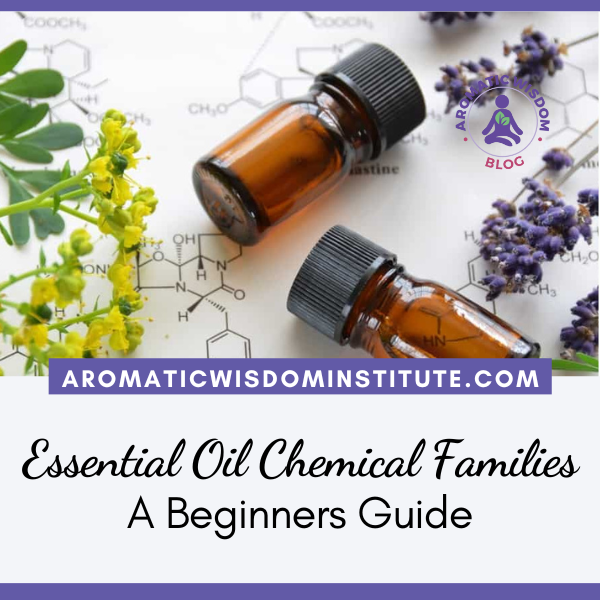PREFER TO LISTEN? Click on the circle below or go to the podcast
In today’s blog post, we will delve into the fascinating world of essential oil chemistry. Discovering the essential oil chemical families, what they entail, and how familiarity with them can significantly enhance your blending skills will be the focus of our exploration.
Importance of Essential Oil Chemistry
Understanding essential oil chemistry is crucial for aromatherapists, wellness advocates, and essential oil therapists alike. Whether you’re using essential oils for personal well-being or as a professional, delving into their chemistry will deepen your comprehension of their therapeutic effects.
Organic Chemistry in Essential Oils
Essential oils consist of natural plant chemical compounds, representing organic chemistry. Every plant compound has a specific chemical composition, forming the basis of essential oil chemistry. The terms “compound” and “constituent” are used interchangeably in this context.
GCMS Analysis: Unveiling Essential Oil Composition
Gas Chromatography-Mass Spectrometry (GCMS) is a powerful tool used to analyze essential oil composition. By obtaining a GCMS report, you can discern the precise percentages of each component in an essential oil.
Chemical Families: A Key Concept
Essential oils are often categorized into chemical families based on their components. Suppliers may group similar molecules together, providing insight into the therapeutic actions of the oil.
Understanding Therapeutic Actions
Knowing the chemical family of an essential oil allows you to predict its therapeutic actions. For instance, essential oils high in monoterpene components are known for immunity support. This knowledge aids in making informed choices when formulating blends.
Aromatherapy Certification Program Insights
In comprehensive aromatherapy certification programs, students study in-depth the characteristics of 10 chemical families. This understanding empowers them to make informed decisions and formulate blends with precision.
Safety Considerations
Knowledge of essential oil chemistry also enhances safety awareness. Professionals can identify unsafe practices or recipes by recognizing the chemical families involved, preventing the spread of misinformation.
Conclusion
In conclusion, delving into essential oil chemistry is a journey that opens new dimensions in aromatherapy. By familiarizing yourself with the 10 common chemical families, you gain insights into the therapeutic actions and safety considerations of essential oils.
Take the First Step
If you’re intrigued by essential oil chemistry, start by learning the characteristics of each of the 10 chemical families. This foundational knowledge will serve as a stepping stone for interpreting GCMS reports and making informed choices in your aromatic journey.
Join Our Aromatherapy Certification Program
For those seeking a deeper understanding, consider enrolling in an Aromatherapy Certification Program. Such programs offer hands-on experiences, allowing you to create products and blends for each chemical family, enriching your understanding of essential oil chemistry.
Remember, the world of essential oil chemistry is vast and intricate. Take it one step at a time, and soon you’ll find yourself navigating this aromatic realm with confidence and expertise. Happy blending!





Thanks, Liz! I always wanted more information about the Chemical Families. Your print out on those is great. I love and use hydrosols for everything. They are not as strong as essential oils, but heave the same chemicals in them, along with water, I guess. I use Rosemary in the morning on my hair!
Hi Liz,
Thank you for this interesting podcast. There is a lot of very important, but hard to remember information. It would be very helpful to have a cheat sheet whee we can also see at a glance which oils belong to which families, safety issues and how fast they could expire.
Also if you can mention the oils besides each family on your cheat sheet which you have linked to from this page it would be helpful. Than you.
How interesting,
Thanks for sharing this podcast with so useful information aboutr the oils chemical Families
I just discover you blog, I love it !!
Thank you, Liz, for this interesting podcast.
Your whole blog is great as well!
I started with related post section of this article and still haven’t finished 🙂
Aww that’s so great to hear Sascha! Thank you for your kind words and please don’t hesitate to contact me if I can answer any questions. Warm Regards, Liz
Essential oils are the best thing to use when I massage my body after work, it relieves my tiredness…
What essential oil do you find give you energy John? I love the citrus oils and rosemary; so uplifting and brighten my day! Liz
Thanks, Liz for the useful article! I’m a big fan of essential oils. Im currently using Lavender Oil and feel so great, very satisfied